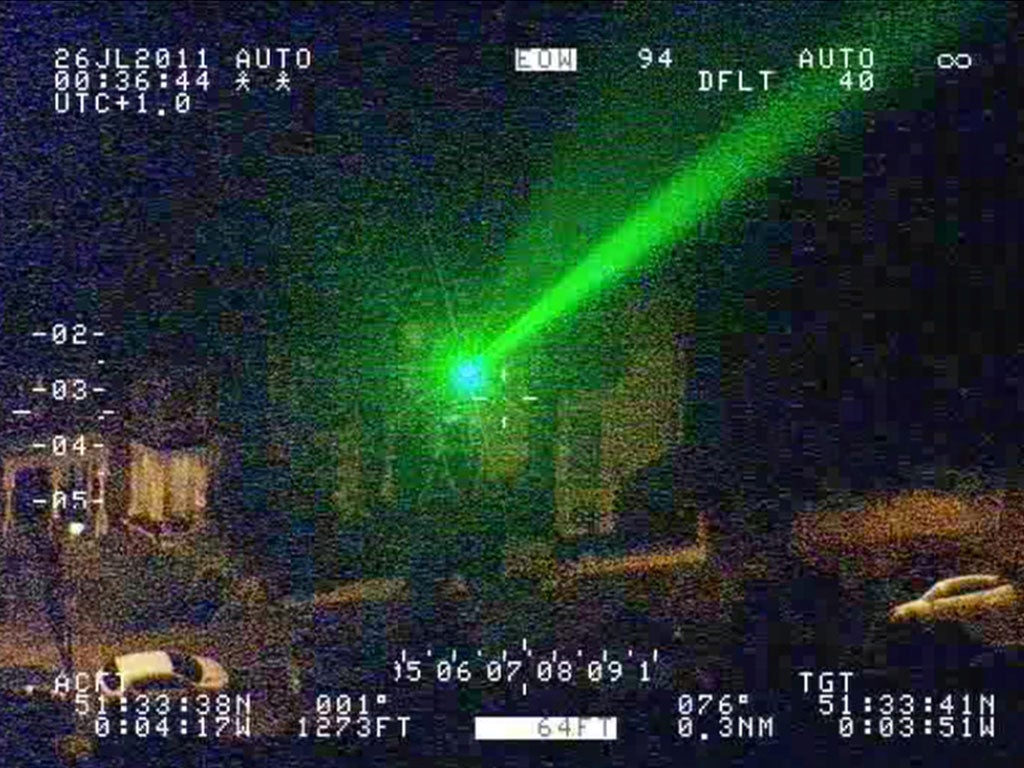Huge rise in cases of pilots being targeted by lasers
Airlines and unions seek ban on 'weapons' that could blind air crew and cause mass fatalities

Lasers so powerful they can temporarily blind people six miles away are being shone at pilots of commercial passenger flights and high-speed train drivers with increasing frequency. So concerned are airport authorities that airlines and Balpa, the pilots' union, are calling for these "weapons" – easily available on the internet – to be banned.
There were more than 4,200 incidents involving aircraft in Europe in 2010, three times the number in 2008. The International Air Transport Authority puts the number of incidents involving lasers globally at 12 a day, up 50 per cent on last year.
Just a week ago, two passenger jets landing at West Country airports were targeted. Heathrow and Gatwick are also trouble spots. Last year there were 1,494 recorded cases in the UK, and in the summer of 2010 there were two "very serious near accidents", where pilots of commercial flights – carrying up to 400 passengers – were forced to hand over control to their co-pilots and receive guidance from air traffic control after being temporarily blinded. Sergeant Richard Brandon of the Metropolitan Police Air Support Unit said: "This is a massive problem... I don't think people realise the seriousness of the issue."
Some 80 per cent of incidents occur during landing, where full concentration is required. In September last year Radu Moldovan, a Romanian strawberry-picker in Scotland, was jailed for four months for shining a laser into the cockpit of an RAF Tornado while it was conducting a complicated landing manoeuvre.
Police helicopters have also been hit, but they are equipped with specialised equipment to track sources of laser beams and identify perpetrators. During the Pope's visit to Glasgow last year, an 18-year-old man from Strathclyde was charged after aiming a laser at a police helicopter.
The most common laser used is green. Although their sale is prohibited in UK shops, they can be purchased online for less than £15, either from specialist vendors or sites such as eBay. The least powerful produce a beam roughly 60 times stronger than that of a red laser, commonly used in handheld laser pointers, and are sufficient to endanger aircraft and cause long-term retinal damage.
More powerful lasers are available from specialist websites that ship to the UK. These range from 5mW handheld lasers (300 times stronger than a red laser) for less than £25 to 800mW green lasers for less than £900. Also for sale are even higher-powered 800mW blue lasers: according to police, it "will blind someone if it hits them in the eye".
The main danger is to a pilot's vision, either by a laser being shone directly into the eyes, or by reflecting off the cockpit windshield and filling cabins with light, making it impossible for pilots to see. Other significant risks are retinal burns and "flash blindness", which causes black spots to appear in front of the eyes; it can last for up to 10 seconds.
Despite the amendment in 2010 of the Air Navigation Order, which made it illegal for lasers to be shone at aircraft, people have not been deterred. Airline authorities and transport unions are calling on the Government to introduce legislation similar to that in Australia, where the sale and use of lasers is tightly controlled.
The Civilian Aviation Authority and Balpa are pushing for an EU-wide law to make shining lasers at aircraft a criminal offence. The maximum penalty in the UK for intentionally endangering an aircraft is five years' imprisonment, but British pilots are concerned that other European states do not charge those who direct lasers at planes, many of which are British flights. Greece is one particularly problematic area.
While the majority of perpetrators are "just kids", according to Dave Reynolds, flight safety and security officer at Balpa, there have been cases of "disgruntled adults", annoyed at aircraft noise, who have bought powerful lasers and shone them at aircraft.
Bookmark popover
Removed from bookmarks